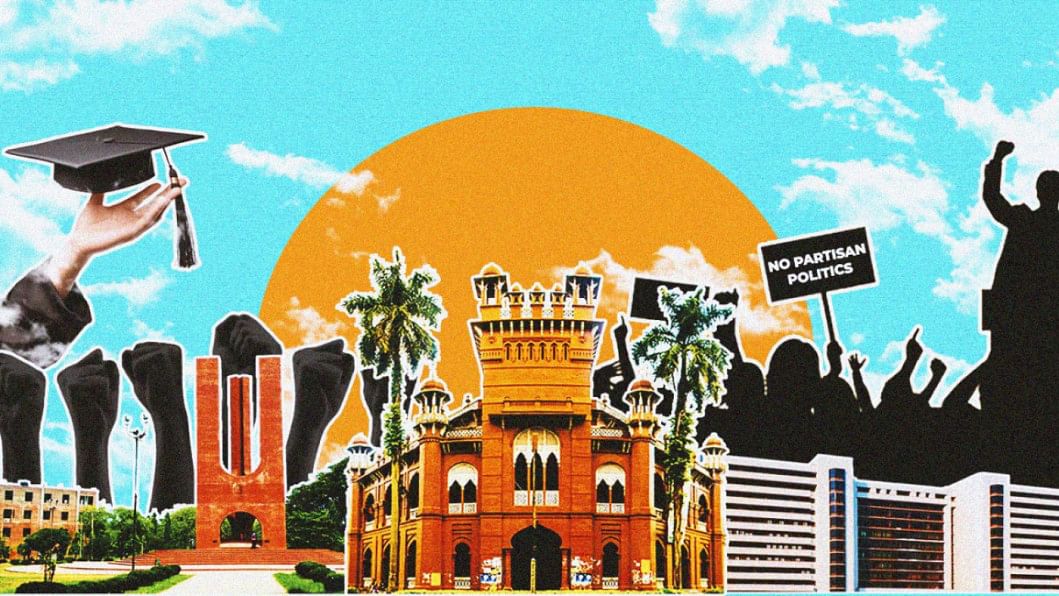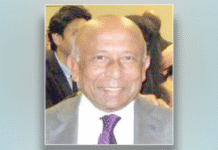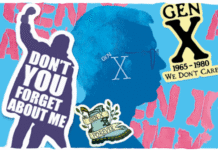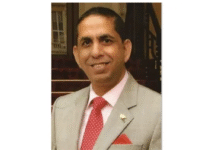
After the student-led mass uprising ousted the autocratic Prime Minister Sheikh Hasina and forced her to flee abroad, a wind of change has swept across the country, calling for reforms in almost every sector, including universities. Among them, the call to ban student politics is growing louder each day.
Consequently, at least 18 public universities across the country have already implemented such a ban. On Thursday, September 19, Dhaka University (DU), the country’s oldest university, joined this movement. While the ban on student politics at other public universities is significant, DU’s decision is particularly impactful as it has been the epicentre of student politics since the early years of Pakistan and the pre-independence era, where student mobilisation played a crucial role in the freedom struggle.
DU has historically been the birthplace of almost every movement that has enabled the people of this land to speak in their mother tongue, win sovereignty and independence, drive away autocrats, and restore democracy, often at the cost of the lives of student activists. Therefore, DU’s decision is expected to have a ripple effect on other universities.
As of yet, the authorities have not released an official statement explaining their decision, and sources at DU confirm that no formal discussions with existing student organisations have taken place. However, the decision came just a day after Tofazzal Hossain—an individual suffering from mental health issues—was beaten to death by students at Fazlul Huq Muslim Hall, DU, on suspicion of stealing.
This leads to the obvious question: why have the people of Bangladesh become disillusioned with student politics, which for decades was seen as a vital training ground for the nation’s future leaders? The answer lies in the rise of “sycophantic student politics,” where student leaders have become entirely loyal to their parent political parties, often prioritising personal gain over genuine activism or student welfare.
These student leaders, especially those aligned with ruling parties, have become pawns in power politics. Such sycophantic leaders create oppressive atmospheres on campuses. They assert dominance in residence halls, control seat allocations, and force students to join their political organisations—as a result, ragging, extortion, drug dealing, and other criminal activities have become rampant. Opponents are driven off campus, dissenting voices are silenced, and general students who speak out against their misrule are often met with violence.
But was student politics in the country always this way? The answer is no.
Student activism has a proud history in Bangladesh. Students played a pivotal role in the Language Movement, which resulted in Bangla being established as one of the nation’s official languages.
Even when major political parties hesitated to break the Section 144 curfew on February 21, 1952, it was students who took the decisive step. Again, students played a key role in the formation of the Jukta Front in 1954. In 1962, they protested against the education policy of military dictator Ayub Khan and demanded the restoration of democracy. In 1966, students were among the first to support Sheikh Mujibur Rahman’s Six-Point Movement, even when the Awami League was still uncertain about the programme’s future.
In 1969, with most national leaders imprisoned, students were a major force behind the mass uprising that hastened Ayub Khan’s downfall. It was student leaders who designed and hoisted the first version of the national flag. After independence, student organisations urged the government to implement a secular and scientific education policy for the newly-formed nation. They also contributed to nation-building, though intra-party conflicts within the Bangladesh Chhatra League were common, and students were sometimes killed in the process. However, coexistence between all student wings still persisted.
During the military dictatorship of Ziaur Rahman, student politics took a backseat. In 1976, his Political Parties Regulation allowed student organisations to continue operating only as affiliates of mainstream political parties, marking the start of their transformation into student wings of political parties.
Under another military dictator, HM Ershad, money and weapons became widely accessible to student politicians aligned with his regime. Yet, students played a key role in the mass uprising that eventually toppled Ershad.
Even after democracy was restored, the decline of sycophantic student politics continued. Ruling party-backed student organisations took control of campuses, and incidents of violence, assaults, and even student killings became frequent.
This led to widespread depoliticisation, and many began to view student politics as “dirty,” with student politicians increasingly seen as thugs. This perception was reinforced by the failure of these student leaders to advocate for student causes.
Notable protests in the late 1990s and early 2000s—such as those against Dhaka University’s fee increase and the suppression of female students at Samsun Nahar Hall were led by general students rather than formal student organisations. Even the 2013 Shahbagh movement, calling for the trial of war criminals, saw students organising under the banner of Ganajagaran Mancha rather than formal student organisations.
The recent mass uprising that toppled Sheikh Hasina’s government was also led by students frustrated with the oppression of the Chhatra League on campus and the Awami League government more generally. However, they did not associate with formal student organisations.
While students are disinterested in current student politics due to the ruling party-backed organisations’ misconduct, they are not opposed to movements that fight oppression. They want to participate in efforts for the betterment of the country and the protection of student rights.
The pressing question is how to separate “sycophantic student politics” from genuine student activism that serves the nation’s interests and ensures student rights. One solution could be to establish mechanisms that hold student organisations accountable to the student body. Though such mechanisms exist on paper, they are not effectively implemented.
One key measure would be the regular election of student unions. These elections would force student leaders to present their credentials to the student body and serve as a tool for accountability. Leaders involved in violence or misrule would likely be rejected at the ballot box. However, these elections must be free and fair.
Educational institutions could also introduce terms and conditions disqualifying members of sycophantic organisations from running in union elections. The challenge lies in defining which organisations are sycophantic and which engage in genuine activism.
According to the Representation of the People Order 2008, a political party registered with the Election Commission cannot have a student body as an affiliated organisation. However, political parties often bypass this rule by labelling student organisations as “brotherly” or “associate” bodies. Authorities should ensure that political parties are prohibited from having affiliated student organisations in any form. This would free student organisations from political party influence.
The anti-discrimination student movement, which ousted the Awami League-led government, included in its eight-point demands a call to ban “sycophantic student politics” and establish effective student unions in every university. Some may argue that these measures would infringe on students’ right to freedom of association. Indeed, students should engage in politics and have the freedom to express their ideologies.
Debates and discussions on diverse perspectives enhance critical thinking and foster tolerance, both of which are essential for universities to be centres of free thought and democratic principles. However, students should not use campuses as platforms for political practices that disrupt discipline. So, a change in the mindset of both political parties and student organisations is essential to bring about these reforms.
Daily Star









